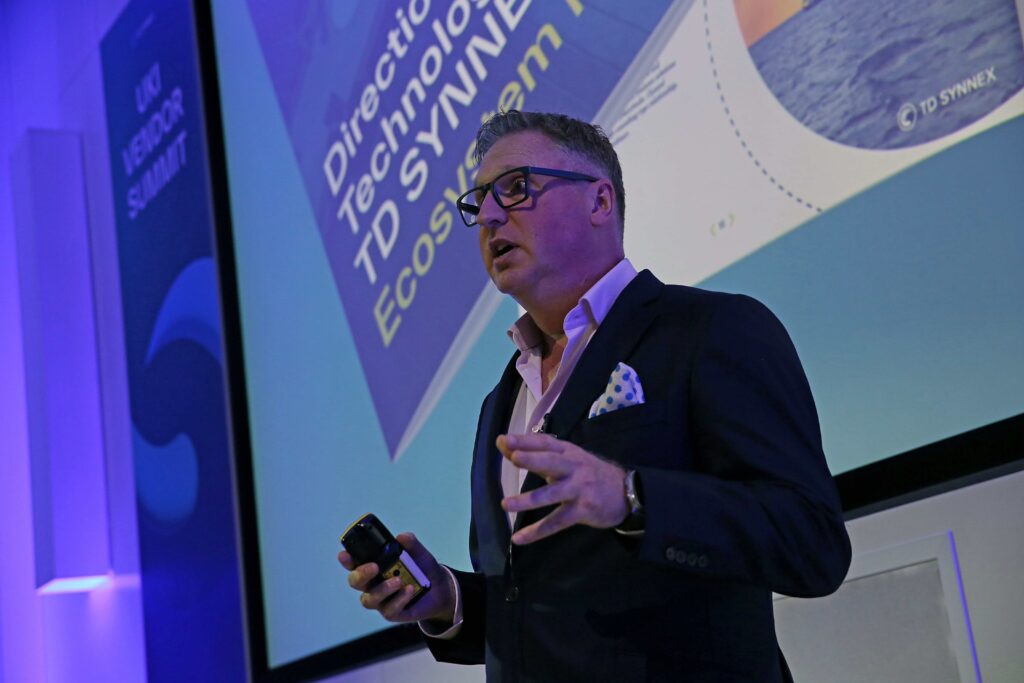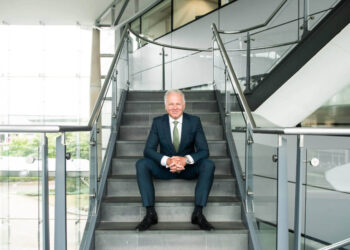The “volume opportunity” for the channel around GenAI probably won’t emerge until 2025, TD Synnex’s UK&I MD Dave Watts told IT Channel Oxygen at the distributor’s Vendor Summit.
Watts also opened up on a range of other topics, predicting that the disruption in VMware’s channel “will be over soon”, and warning of the “danger” of being left behind on sustainability.
“I don’t think we’ll see the GenAI volume opportunity until 2025”
Excluding Microsoft Copilot and the GenAI capabilities embedded in vendor propositions, Watts predicted it will be 2025 “before most larger VARs and distributors see it as a percentage of their turnover that is meaningful”.
“I don’t think we’ll see the volume opportunity until 2025,” he told IT Channel Oxygen following his keynote at the event.
GenAI that is embedded in technology already, alongside Microsoft Copilot, is the “really obvious starting place” for GenAI, however, Watts said.
“Understand what it is doing, because you may not have realised you are doing very much – and ensure your customer understands what it’s doing,” he advised. “Then you can start taking them on that AI journey and saying to a customer ‘you’re already deploying it, you probably just don’t know it’.”
“VMware changes are aggressive, but it will be over soon”
As a VMware distributor, what is Watts’ message to the virtualisation giant’s partner base in the wake of its divisive overhaul by new owner Broadcom?
“It’s been tough – there’s no doubt about it,” Watts responded.
“We’re confirmed in our position now officially as a distributor going forward. I think we may be a net beneficiary of some direct partners not being able to go direct anymore. So our position is solid.
“Our message to the partners we work with that are impacted by this is that stability will come. The nature of the way the channel changes have been brought about is aggressive, but it’s really fast and will be over soon. Then we’ll have clarity as to who is doing what.
“I think the burden will be much more on the channel – particularly the distributors – to drive that business, and we’ll pick up that responsibility.”
“There are probably more resellers on the cusp than three years ago”

In his keynote, Watts said the distributor is starting to see some reseller insolvencies, remarking that “the data tells us to be careful about some of those partner positions”.
£76m-revenue Box Ltd became a high-profile casualty of the e-tail market downturn only in January.
What is Watts hearing from the credit insurers, and is TD Synnex having to take on more risk itself?
“We are as much uninsured as insured on any of amount of sales outstanding in our resellers anyway, so it’s a position we’re used to,” he replied.
“I don’t know if [the credit insurers’] position is becoming more conservative, but I suspect it probably is.
“What we are seeing is resellers presenting results, or a lack of capacity around cash, to the insurers, and that is making them react in a way that they would have reacted three years ago; it’s just that there are probably more people on the cusp than there were previously.
“Traditional VARs with low services and low IP, who are selling lots of laptops, will have had a really tough time. And if you’ve taken on a lot of debt during Covid and you’re still trying to work that through, your pinch point is now.
“If we see more [insolvencies] this year – and I suspect we will – those will be the reasons why, rather than a fundamental change in the credit insurance market.”
“The danger is that you get left behind on sustainability”
TD Synnex UK&I will soon be net zero for scopes 1 and 2, Watts said earlier in the day.
But as the CEO of a sizeable organisation – particularly in light of the UK government’s backsliding on net zero – does he ever feel he may lose the faith of shareholders, investors and the Board if he moves too quickly on sustainability?
“I think the mood music and the activity of governments, particularly in Europe, is so strong that I don’t think it’s a concern that’s real,” he replied.
“The danger is the other danger, still. Namely, that you get left behind and start thinking about it when it’s too late – when tenders have already changed aggressively and you’ve got no proposition.
“I think the problem is that we’re not going to be ready as a channel, rather than we will have gone to soon, so I’m not worried about that.”
Doug Woodburn is editor of IT Channel Oxygen














